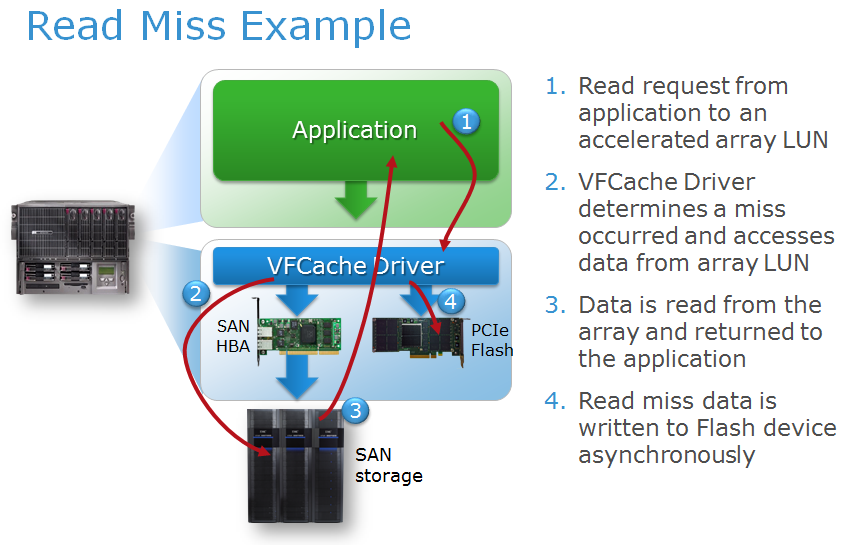EMC, well known for their various enterprise storage products, has announced the release of their VFCache SSD caching solution for servers.
According to EMC, VFCache utilizes PCIe SSDs in order to accelerate I/O performance by at least 3 times while reducing latency by 60%.
EMC is touting the new product as a perfect complement to their VMAX, VMAXe, VNX and VNXe flash enabled arrays, although it can be integrated into any rack mounted server.
That is the point, of course, as one of the main benefits of SSD caching is cost effectiveness, due to the ability to bring the performance of conventional storage up to near SSD speeds. EMC cited figures of over 4000x when it comes to the speedup afforded a 15k HDD array by the inclusion of their caching PCIe SSDs. That certainly is an impressive boost, and should significantly improve the performance of even the most demanding applications.
 The company also mentioned that VFCache incorporates their FAST (Fully Automated Storage Tiering) technology. Think of this as a kind of memory hierarchy for storage systems, with the PCIe SSDs being the L1 cache, regular SSDs serving the function of the L2 cache, and finally, mechanical drives playing the role of main memory. Like a processor, the newest data will be held in the fastest part of the memory hierarchy.
The company also mentioned that VFCache incorporates their FAST (Fully Automated Storage Tiering) technology. Think of this as a kind of memory hierarchy for storage systems, with the PCIe SSDs being the L1 cache, regular SSDs serving the function of the L2 cache, and finally, mechanical drives playing the role of main memory. Like a processor, the newest data will be held in the fastest part of the memory hierarchy.
 Finally, EMC talks about “Project Thunder”. Described as “a server networked flash-based appliance” the device will be implemented using VFCache, and as such should also serve as an excellent reference design.
Finally, EMC talks about “Project Thunder”. Described as “a server networked flash-based appliance” the device will be implemented using VFCache, and as such should also serve as an excellent reference design.
 All of this really does sound quite good, but EMC isn’t the first company to deliver this type of product. Fusion-io is also known for their numerous server caching solutions, including offerings that function in a similar manner to EMC’s new progeny. Many see this release as EMC demonstrating their intention to impinge on the server space, which is based on the idea that their storage business has hit a plateau of sorts.
All of this really does sound quite good, but EMC isn’t the first company to deliver this type of product. Fusion-io is also known for their numerous server caching solutions, including offerings that function in a similar manner to EMC’s new progeny. Many see this release as EMC demonstrating their intention to impinge on the server space, which is based on the idea that their storage business has hit a plateau of sorts.
EMC has subsequently denied this, even though some see the enterprise storage market as being quite mature. Of course, time will tell if their branching out ends up being a success. Based on initial market response to SSD caching, I would say this strategy will probably end up being fruitful for EMC.
An interesting aspect about this news is that it comes at a time when SSD caching is becoming more and more prevalent in the consumer space. It’s true that with the advent of the Ultrabook, SSD caching is set to be a hot topic for the rest of the year. This is fully justified, of course, as caching has the potential to provide substantial cost and performance benefits; OCZ’s recent RevoDrive Hybrid seems to be a perfect example of this.
 When it comes to Ultrabooks, which seem set to be one of the primary beneficiary’s of this technology, thus far, only one company’s SSD caching software has been used, that being NVELO’s. That’s okay for now, but this does definitely seem like a golden opportunity, the likes of which doesn’t present itself very often. Specifically, it appears to be the perfect time for other firms, including those with enterprise roots, to enter the SSD caching fray and start providing some real competition in this burgeoning market segment.
When it comes to Ultrabooks, which seem set to be one of the primary beneficiary’s of this technology, thus far, only one company’s SSD caching software has been used, that being NVELO’s. That’s okay for now, but this does definitely seem like a golden opportunity, the likes of which doesn’t present itself very often. Specifically, it appears to be the perfect time for other firms, including those with enterprise roots, to enter the SSD caching fray and start providing some real competition in this burgeoning market segment.
Even more intriguing is the idea of companies offering this type of software directly to consumers without tying it to specific products. Just think about it, users having the choice of whether or not to convert their SSD into a caching drive and being able to decide which program they want to buy. Such an outcome would, of course, require HDDs to hang around, but otherwise, it really would be a positive situation for any potential buyers. The only question would be how much cash you’re willing to spend on you’re cache. Sorry, I couldn’t resist.
See Press Release On Next Page……
 The SSD Review The Worlds Dedicated SSD Education and Review Resource |
The SSD Review The Worlds Dedicated SSD Education and Review Resource | 